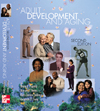
Mental Health, Coping, and Adjustments to Aging |  |
Learning ObjectivesFollowing the completion of this chapter, students will be able to: - Define coping and explain why it is important to mental health.
- Identify and describe environmental models of coping.
- Describe coping mechanisms identified by behavioral models.
- List and describe the adaptive mechanisms associated with the psychoanalytic coping-style models.
- Describe strategies of coping characterized by cognitive-appraisal models.
- Describe the basic assumptions of normative models of successful aging.
- Compare and contrast the balance models of successful aging.
- Discuss the differences between theorists' and laypeople's perceptions about successful aging.
- Define substance abuse and substance dependence; discuss cohort effects and specific substances people abuse and upon which they become dependent.
- Describe the nature and prevalence of partner abuse; identify characteristics of abusers and victims.
- Define and describe the causes of child abuse and neglect.
- Describe the nature and prevalence of elder abuse across cultures.
- List and describe correlates of mental health and life satisfaction.
- List and explain the characteristics of mental disorders in aging adults.
- Discuss the implications of Kivnick's study of the life strengths of older adults.
|
|
|